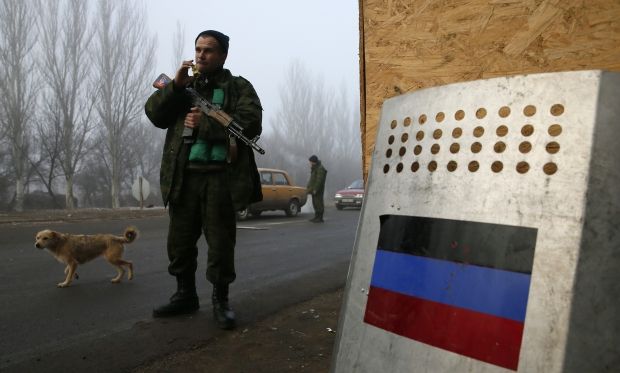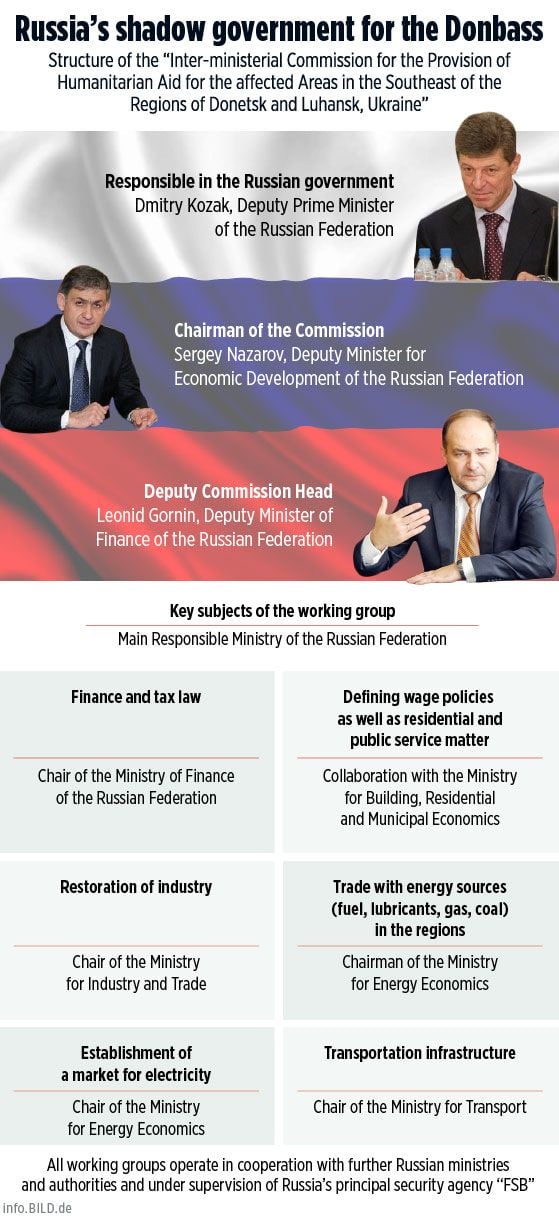
In this regard, the concrete plans extend far beyond "humanitarian issues". In six working groups, the subject areas of "Finance and tax law," "Defining wage policies as well as residential and public service matters," "Restoration of industry," "Trade with energy sources," "Establishment of a market for electricity" and "Transportation infrastructure" are being planned down to the last detail. The regions are consequently being treated as parts of Russia's sovereign territory, BILD reported.
The commission, which an insider referred to as "shadow government of the Donbas" while talking to BILD, includes Dmitry Kozak, Deputy Prime Minister of Russia and close friend of Vladimir Putin; Deputy Minister for Economic Development Sergey Nazarov, Deputy Minister of Finance Leonid Gornin. The secret service "FSB" has supervision over each working group.
As the sole Ukrainian, a representative of the Ukrainian energy giant DTEK owned by the oligarch Rinat Akhmetov was present at the meeting in October last year, according to the record.
Officially, Kozak and Nazarov work together within the framework of the "Commission for the Socio-economic Development of the Republic of Crimea and Sevastopol." This commission met, amongst other dates, on October 15, 2015, only a few days before the secret session of the Donbas Commission.
As BILD has found out, regular meetings of the Commission were actually held at intervals of two to four weeks. But nothing was known about their content – until now.
Just five months after the commission was founded, the entire occupied areas began to be supplied with Russian rubles, as BILD reported exclusively in January 2016. This measure may have come about as a result of the commission's work. The plans now unveiled extend far beyond maintaining financial support for the so-called "DPR-LPR."
Read alsoBILD: Russia spends about EUR 79 mln on Donbas salaries, pensions per monthEvidently, the Russian government has assumed control over all areas of state responsibility for the occupied areas of the Ukrainian regions – and this without Ukrainian involvement, not even the pro-Russian militants. This not only determines the present destinies of the areas with roughly three million inhabitants. The long-term planning for the future of the territory is also pressing ahead.

Intelligence agency sources have confirmed to BILD that it actually appears as though Moscow is completely controlling the Ukrainian region. The still contested part of Donbas appears "like a satellite state of Russia," is how experts interpreted the situation.
Put simply, this means that Moscow is only promoting the implementation of the Minsk Agreement as a show for the West. Behind the curtains, a separate plan for the controlled areas in Donbas has been put into effect since the end of 2014 (only three months after signing the peace plan Minsk).
Read alsoRussia planning large-scale provocative shelling of ATO forces – Ukraine intelRather than envisaging a reintegration of the regions in the Ukraine over the medium term, this plan aims to secure its long-term existence under complete Russian control.
Russia is planning a permanent stabilization of the political, social and economic situation in Donbas under its control. That will make Donbas a puppet state of the Russian Federation, whose future is set to be decided exclusively in Moscow. This is confirmation of the failure of the Minsk Agreement, adherence to which by Russia is merely pretense.
Furthermore, the west's demand that Ukraine should enable democratic elections in the areas not under its control is taken to the absurd by the revelation. The political figures up for elections in such vote would not be the ones in charge for the development of the area. Those that hold on to power are located in Moscow.

